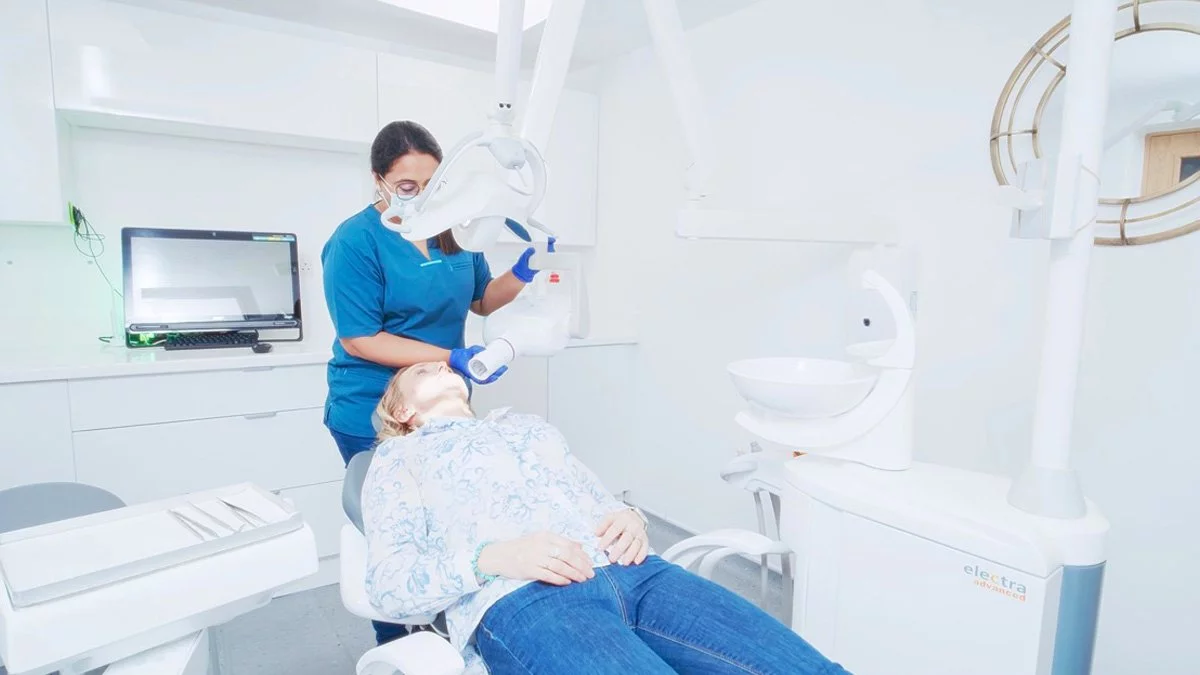Whether replacing a single tooth or multiple teeth, dental implants offer numerous advantages over traditional tooth replacement options like bridges or dentures. We want to explore the myriad benefits of dental implants, shedding light on why they are increasingly becoming the preferred choice for both patients and dental professionals alike.
Benefits of Dental Implants
- Natural Appearance: Looks and feels like natural teeth.
- Improved Functionality: Stable and comfortable for biting, chewing, and speaking.
- Long-Term Durability: Can last a lifetime with proper care.
- Jawbone Preservation: Prevents bone loss and maintains jaw structure.
- Adjacent Teeth Preservation: No need to alter surrounding teeth.
- Comfort and Convenience: Eliminates the issues of removable dentures.
- Enhanced Speech: Provides clear and stable speech.
- Improved Oral Health: Easier to clean and maintain, reducing oral health risks.
- Customized Treatment: Personalized to individual patient needs.
- High Success Rates: Reliable and effective with success rates over 95%.
- Improved Self-Esteem: Boosts confidence with a natural, complete smile.
- Stable Foundation: Securely supports replacement teeth
Superior aesthetic appeal
The aesthetic appeal of dental implants goes beyond merely filling the gap left by missing teeth; it encompasses a seamless integration into the existing dental structure, replicating the natural look and feel of original teeth. This lifelike resemblance is achieved through meticulous customization, where the color, shape, and size of the implant crown are tailored to harmonize with the patient’s surrounding dentition. Unlike traditional dentures, which may exhibit telltale signs of artificiality or bulkiness, dental implants blend seamlessly with the natural teeth, creating a uniform and aesthetically pleasing smile.
Furthermore, the stability and firmness provided by dental implants contribute significantly to their aesthetic allure. Unlike dentures, which may shift or slip out of place during speech or chewing, implants remain securely anchored within the jawbone, ensuring a confident and natural smile. This stability not only enhances the appearance of the smile but also prevents the sunken facial appearance commonly associated with tooth loss and removable dentures.
The psychological impact of a restored smile should not be underestimated. For many individuals, the presence of missing teeth can erode self-confidence and self-esteem, leading to social withdrawal and avoidance of social interactions. By restoring a complete and attractive smile, dental implants empower patients to face the world with renewed confidence and positivity. Whether in professional settings, social gatherings, or everyday interactions, a radiant smile can leave a lasting impression and enhance overall well-being.
Enhanced oral functionality
Beyond aesthetics, dental implants provide significant improvements in oral functionality, addressing both practical and health-related concerns that arise from tooth loss. Traditional dentures, while beneficial in restoring basic appearance and function, often come with limitations that can affect everyday activities such as eating and speaking. These prosthetic devices may slip, shift, or cause discomfort, particularly when consuming harder or stickier foods. In contrast, dental implants offer a stable and reliable solution, revolutionizing the way patients experience oral function.
The key to this stability lies in the design and integration of dental implants. The implant itself, typically made of biocompatible titanium, is surgically inserted into the jawbone, where it undergoes a process called osseointegration. This process involves the fusion of the implant with the bone, creating a robust and permanent foundation that mimics the strength and stability of natural tooth roots. Once osseointegration is complete, the implant serves as a secure anchor for the dental crown, bridge, or denture, ensuring that the prosthetic remains firmly in place.
This enhanced stability translates into numerous functional benefits for patients. One of the most significant advantages is the ability to bite and chew with confidence. Dental implants allow individuals to enjoy a varied and unrestricted diet, including foods that might pose challenges for denture wearers, such as apples, nuts, and steak. This not only enhances the pleasure of eating but also contributes to better nutrition and overall health, as patients are not limited to softer, less nutritious foods.
The secure fit of dental implants eliminates many of the common issues associated with traditional dentures. There is no need for adhesives to keep the prosthetic in place, nor is there the discomfort of sore spots or the embarrassment of dentures slipping while talking or laughing. This reliability enhances the patient’s ability to speak clearly and confidently, without the worry of dental appliances shifting or causing speech impediments.
Long-Term durability
Dental implants are renowned for their exceptional durability and longevity, standing out as one of the most robust solutions for tooth replacement available today. The design and materials used in dental implants contribute significantly to their strength and resilience, ensuring they can withstand the rigors of daily use over many years.
The core of a dental implant is typically made from titanium, a biocompatible metal known for its strength and ability to fuse with human bone through a process called osseointegration. This fusion creates a stable and permanent bond between the implant and the jawbone, allowing the implant to function like a natural tooth root. Once the implant has fully integrated with the bone, it provides a secure foundation for the dental crown, bridge, or denture that will be attached to it.
One of the key advantages of dental implants is their potential for lifelong use. With proper care and maintenance, which includes regular brushing, flossing, and routine dental check-ups, implants can last for decades, often outlasting other dental prosthetic options. This durability makes dental implants a wise long-term investment. Patients can enjoy the peace of mind that comes with knowing their dental restoration is not only effective but also built to endure the test of time.
In contrast, traditional dental bridges and dentures, while effective in their own right, generally have a shorter lifespan. Dental bridges, for example, typically need replacement every 5-10 years due to wear and tear, potential decay of the supporting teeth, or changes in the fit as the mouth evolves over time. Dentures also require regular adjustments and replacements to maintain their fit and function, as the underlying bone and gum tissues can change shape over time.
The frequent need for replacement and adjustment of these traditional options can be both inconvenient and costly for patients. Each replacement cycle involves additional dental visits, potential discomfort, and financial outlay. In comparison, dental implants, with their long-lasting nature, eliminate much of this hassle. Once an implant is placed and properly integrated, it requires no more maintenance than a natural tooth, thus reducing the long-term costs and inconveniences associated with other tooth replacement methods.
The stability and permanence of dental implants contribute to their durability. Unlike dentures, which can move or shift in the mouth, causing irritation and discomfort, implants remain fixed in place. This stability not only enhances comfort and functionality but also protects the surrounding teeth and tissues from the wear and damage that can be caused by movement and friction.
The confidence that comes with knowing one’s dental restoration is durable and long-lasting cannot be overstated. For many patients, dental implants restore not only their teeth but also their quality of life. They can eat, speak, and smile with complete assurance, free from the worry of prosthetic failure or the need for frequent replacements.
Preservation of Jawbone Health
When a tooth is lost, the underlying jawbone may begin to deteriorate over time due to lack of stimulation. Dental implants effectively address this issue by integrating with the jawbone through a process called osseointegration. This not only provides stability for the implant but also helps preserve the surrounding bone structure, preventing further bone loss and maintaining facial aesthetics.
Preservation of adjacent teeth
Unlike traditional bridges, which require the alteration of adjacent teeth for support, dental implants do not compromise the integrity of surrounding teeth. This preservation of natural tooth structure is particularly advantageous in maintaining overall oral health and stability.
Convenience and Comfort
Dental implants offer unparalleled convenience and comfort compared to removable dentures. Once the implant is securely in place, patients can enjoy a sense of normalcy in their daily activities without the need for adhesives or adjustments. This eliminates the inconvenience and discomfort often associated with traditional prosthetics.
Improved speech
Tooth loss can affect speech clarity and pronunciation, leading to communication challenges for some individuals. Dental implants restore proper tooth alignment and function, thereby improving speech patterns and articulation. Patients can speak confidently without worrying about slippage or lisping commonly experienced with traditional dentures.
Enhanced Oral Health
Maintaining optimal oral hygiene is essential for overall health and well-being. Dental implants facilitate easy cleaning and oral care routines, as they can be brushed and flossed just like natural teeth. This reduces the risk of plaque buildup, gum disease, and other oral health issues commonly associated with removable dentures.
Customized Treatment
Every patient is unique, and dental implant treatment is tailored to meet individual needs and preferences. From the initial consultation to the final restoration, dental professionals work closely with patients to design a personalized treatment plan that addresses their specific concerns and goals. This customized approach ensures optimal outcomes and patient satisfaction.
Comprehensive success rates
Extensive research and clinical studies have demonstrated the high success rates of dental implant procedures. When performed by skilled professionals using quality materials, implants boast success rates exceeding 95%, making them one of the most reliable tooth replacement options available today.



